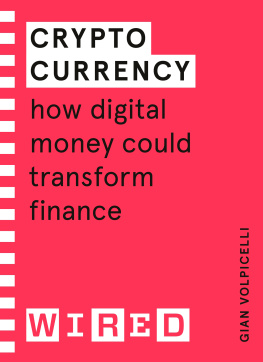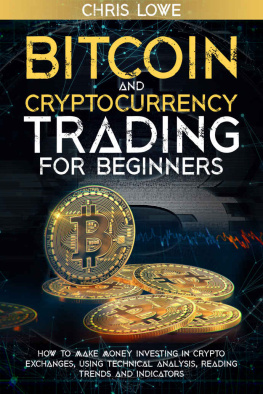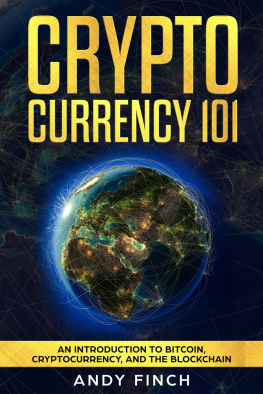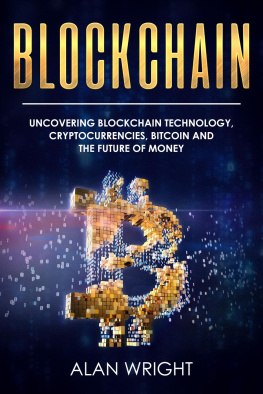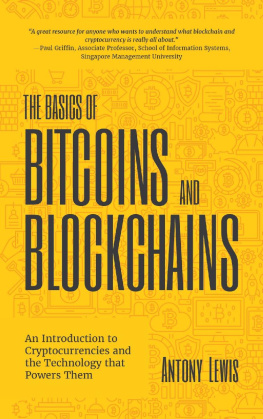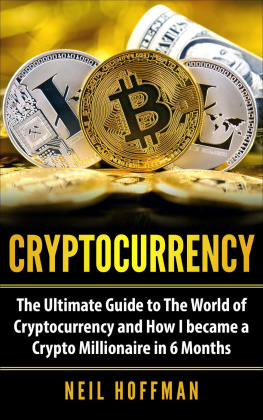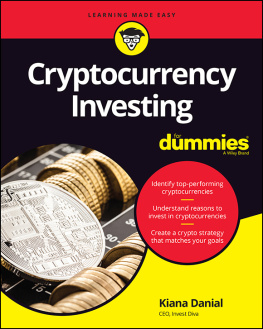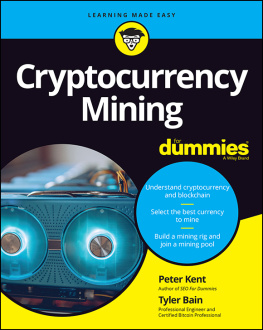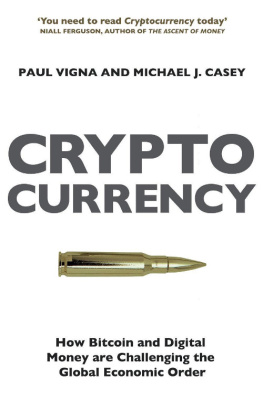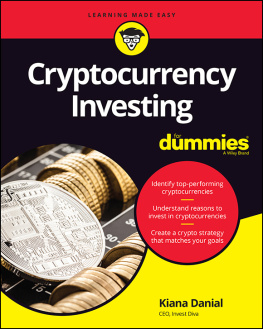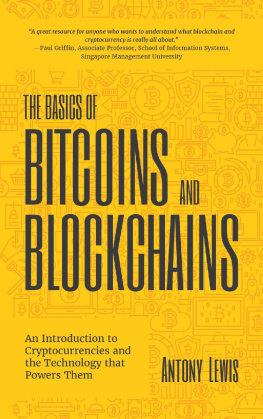
Gian Volpicelli
CRYPTOCURRENCY
How Digital Money Could Transform Finance

Contents
About the Author
WIRED is the worlds most authoritative and respected publication reporting on the emerging trends, ideas and technologies shaping our world. Our mission is to tell the stories of the people who are driving this change and to understand its impact on business, society and individuals. WIRED has become synonymous with informed and intelligent analysis of these transformational forces and the significance of them for industries and individuals and is a consistently reliable predictor of change.
Gian Volpicelli is a Senior Editor for WIRED UK.
Introduction
What is cryptocurrency? you might ask. The question, as so often happens with questions about definitions, has multiple answers. Cryptocurrency is a thriving sector of the technology start-up scene. It is a type of digital money, a coin such as Bitcoin, or Ether or Monero. Cryptocurrency can be a method to cash in on crime and malfeasance.
At its core, cryptocurrency is a technology harnessing cryptographic techniques to make it possible to exchange units of value over the internet without relying on any go-between. By using cryptocurrency, the proverbial Alice can send one unit of value to the proverbial Bob with no involvement of banks, payment companies or authorities of any kind. The integrity of that transfer is ensured by a dispersed collective of computers, none of which has the power to stop or manipulate the payment on its own.
Cryptocurrency is a challenge to the way the financial system has been working for centuries, along pipelines built and maintained by middlemen and third-party entities acting as guarantors of the honesty of transactions. It is also an attempt to facilitate the transfer of money or money surrogates far from the eye, and the reach, of governments. The endgame is disintermediation: the removal of as many human layers as possible from transactions and communications, keeping relationships direct and peer-to-peer. (That is, at least, the intention; the technical reality has in many cases been less than perfect.)
The answer is already, slowly, swerving from the domain of technology to that of political philosophy. And the fact is that cryptocurrency is a political programme as well as a financial one. Another of its key goals is decentralisation, or the idea that a system should not be controlled by one, or a few, actors. Decentralisation, like disintermediation, is typical of the internet age one where politicians strive to bypass media and fact-checkers and win over voters via tweets, or where long-tail e-commerce has condemned many shops to oblivion. That is why the occasional definition of cryptocurrency as internet money makes a lot of sense.
This book seeks to elaborate on these various answers by retracing cryptocurrencys steps. It will tell its history from its origins, three decades ago, up to the latest development. It is a chronicle of the evolution of cryptocurrency, of the principles propelling it forward and of the actions of the people who invented and built it. Over five chapters, each focusing on a particular cryptocurrency era eras, in the industry, are a matter of months I will try and give you as detailed an answer as possible to the question: What is cryptocurrency and why should I care?
Gird your loins. It will be quite a ride.
1
Bitcoin
How crypto started
Cryptocurrency was born as a political project. That is easy to forget when most of the coverage of Bitcoin or Ethereum appears in the financial pages, on technology outlets or on specialised websites reporting on every minimal variation in the value of this or that digital coin. And it is just as hard to discern any coherent ideology at work in the mindless speculation on imaginary currencies, the preposterous peaks and troughs and the splenetic tweets of cryptocurrency evangelists.
One way to look at cryptocurrency, however, is as the endpoint of decades of experiments to bring about a technology that could undermine the very concept of government that is, stateless digital money.
The people pursuing that goal called themselves the cypherpunks, a loose coalition of technologists, scholars and thinkers who first started meeting in the San Francisco Bay area in the early 1990s, and later congealed around the Cypherpunks Mailing List. Cypherpunks are what you get when digital technology becomes mixed up with libertarianism. In the cypherpunks view, the internet was bound to become a space for freedom, autonomy, connection and the untrammelled sharing of knowledge. Threatening that idyll were governments, which would attempt to regulate the internet, use it to spy on its users and eventually rebuild it as a liberty-killing global panopticon. That was where strong cryptography came into play. Cypherpunks hoped that tools like encrypted email, anonymous networks and secure credential systems could make internet users invisible to the eyes of governments and could stave off any hint of Orwellian surveillance. In the long run, generalised use of cryptography would erode the relevance of national laws and regulations in cyberspace. Information would flow freely, and online markets selling everything from copyrighted music files to industrial secrets would mushroom all over the internet.
The ideal end-scenario was crypto-anarchy a term coined by leading cypherpunk and Intel scientist Timothy May in a 1992 tract entitled, indeed, The Crypto Anarchist Manifesto. crypto-anarchy involved the collapse of government and the advent of a political order with no outside rulers and laws. Voluntary arrangements, back-stopped by voluntarily-arranged institutions [] will be the only form of rule. The crypto in crypto-anarchy was both a wink at political slurs like crypto-fascist and a serious acknowledgement of the role cryptography would play in triggering a welcome shift to a system which will develop as cyberspace becomes more important. A system which dispenses with national boundaries, which is based on voluntary (even if anonymous) free trade. At issue is the end of governments as we know them today. No borders, no taxes, no laws.
Not all cypherpunks have been as ardently anti-government as May, a radical ideologue whose political parable would eventually land in far-right territory. But at a bare minimum, most of the mailing lists 700-plus subscribers among them British businessman Adam Back, free-software theorist Richard Stallman and future WikiLeaks founder Julian Assange deemed privacy desirable, surveillance dangerous and dreamed of an internet free from any governmental oversight.
By the time cypherpunks started outlining their vision, some of its pieces were already falling into place. PGP (Pretty Good Privacy), a program that could be used to encrypt online communications, had been launched in 1991. Anonymous remailers systems that rerouted emails to their intended recipients while keeping the sender secret were catching on, adding further layers of anonymity. One thing remained elusive, and that was anonymous digital cash.
The cypherpunk libertarian endgame could not dispense with libertarianisms lynchpin, the free market. In Mays view, cyberspace was not only to become a forum for unimpeded anonymous communication, but also an emporium, where all sorts of goods, services and information licit and, especially, illicit could be traded. Ordinarily, Hughes added, that function is performed by cash.
Next page
